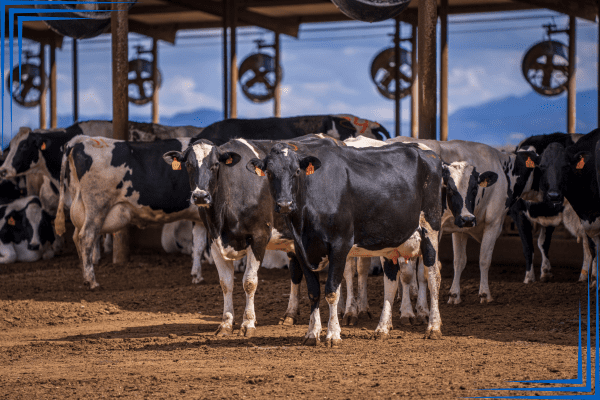Dairy farming is a cornerstone of U.S. agriculture, supplying the milk and dairy products that millions of Americans rely on every day. Behind the scenes, ensuring the quality and safety of milk requires advanced equipment and technology. Among the most critical tools in this process are commercial refrigeration compressors. These essential machines play a vital role in maintaining the cooling systems that are key to dairy farming operations. From milk refrigeration to cooling storage tanks, compressors are indispensable for preserving product quality and ensuring compliance with strict food safety regulations.
Milk Refrigeration: The Heart of Dairy Operations
Milk is highly perishable, and its freshness can degrade rapidly if not stored at the right temperature. When milk is collected from cows, it must be cooled to approximately 37 to 39 degrees Fahrenheit within two hours. This is where refrigeration compressors come into play.
Compressors are the workhorses of cooling systems, pumping refrigerant through the system to absorb and remove heat. By quickly lowering the milk’s temperature, compressors help prevent the growth of harmful bacteria, preserving its quality and extending its shelf life. Efficient milk refrigeration ensures that consumers receive safe, high-quality dairy products, whether a gallon of milk, a tub of yogurt, or a block of cheese.
Cooling Systems for Storage Tanks
Once milk is cooled, it needs to be stored under consistent conditions until it’s transported for processing. Large stainless-steel bulk tanks, often called milk storage tanks, are equipped with advanced cooling systems that rely heavily on compressors. These storage tanks are designed to maintain precise temperatures around the clock, ensuring that milk remains fresh and safe.
The role of the compressor in these systems cannot be overstated. By keeping the refrigerant circulating, compressors ensure that the storage tanks maintain an even, controlled temperature. This is crucial because any fluctuation can compromise milk quality. If the temperature rises even slightly, bacteria can multiply, leading to spoilage. On the other hand, temperatures that are too low can cause freezing, which can damage the milk’s composition.
Importance of Consistent Temperature Control for Dairy Farms
Temperature control is more than just a technical requirement in dairy farming; it’s a critical component of food safety and quality assurance. Compressors ensure that refrigeration systems operate reliably, maintaining the ideal temperature range for milk storage. This consistency is vital for several reasons:
- Preserving Milk Quality: Proper temperature control prevents the development of off-flavors and maintains the nutritional value of milk. Commercial refrigeration compressors’ ability to provide steady cooling helps keep milk in its optimal state.
- Meeting Regulatory Standards: The U.S. Food and Drug Administration (FDA) and other regulatory bodies have strict guidelines for milk storage temperatures. Compressors enable dairy farmers to meet these requirements, avoiding penalties and ensuring that their products are market-ready.
- Energy Efficiency: Modern refrigeration compressors are designed with energy efficiency in mind. By using advanced technology, these compressors reduce energy consumption while maintaining reliable performance. This not only helps farmers lower their operating costs but also supports sustainable farming practices.
- Minimizing Waste: Milk spoilage due to temperature fluctuations can lead to significant financial losses for dairy farmers. Reliable compressors help minimize waste by ensuring consistent cooling and protecting the investment farmers make in their herds and operations.
Choosing the Right Commercial Compressor for Dairy Farms
Given their critical role, selecting the right compressor for a dairy farm’s needs is an important decision. Factors to consider include the size of the dairy operation, the volume of milk produced, and the type of refrigeration system in use. Compressors come in various types, including reciprocating, rotary, and screw compressors, each with its own advantages.
- Reciprocating Compressors: These are common in various sizes of operations due to their cost-effectiveness and reliability. They’re well-suited for systems with moderate cooling needs.
- Rotary Compressors: Known for their quiet operation and compact design, rotary compressors are ideal for small to medium-sized farms.
- Screw Compressors: These are highly efficient and durable, making them a great choice for large-scale dairy farms with high cooling demands.
Consulting with refrigeration specialists can help farmers determine which compressor type best suits their specific requirements.
Maintenance and Longevity of a Commercial Refrigeration Compressor
Like any piece of machinery, refrigeration compressors require regular maintenance to perform optimally. Routine checks and servicing can extend the life of the equipment, prevent breakdowns, and ensure consistent performance. Key maintenance tasks include:
- Inspecting and cleaning the system to remove dirt and debris.
- Checking refrigerant levels and addressing any leaks.
- Ensuring proper lubrication of moving parts.
- Monitoring the compressor’s performance for any unusual noise or temperature changes.
Investing in preventative maintenance helps reduce the risk of costly repairs and minimizes downtime, keeping the farm’s operations running smoothly.
The Future of Refrigeration in Dairy Farming
As technology advances, refrigeration systems are becoming smarter and more efficient. Some modern compressors are now integrated with digital controls and sensors that allow for precise monitoring and adjustments. This level of automation not only improves performance but also provides valuable data that farmers can use to optimize their operations.
Refrigeration commercial compressors are the unsung heroes of dairy farming, ensuring that milk remains fresh from the moment it leaves the cow to when it reaches the consumer’s table. By understanding their essential role and investing in high-quality equipment, dairy farmers can continue to meet the demands of a growing market while maintaining the highest standards of quality and safety.












